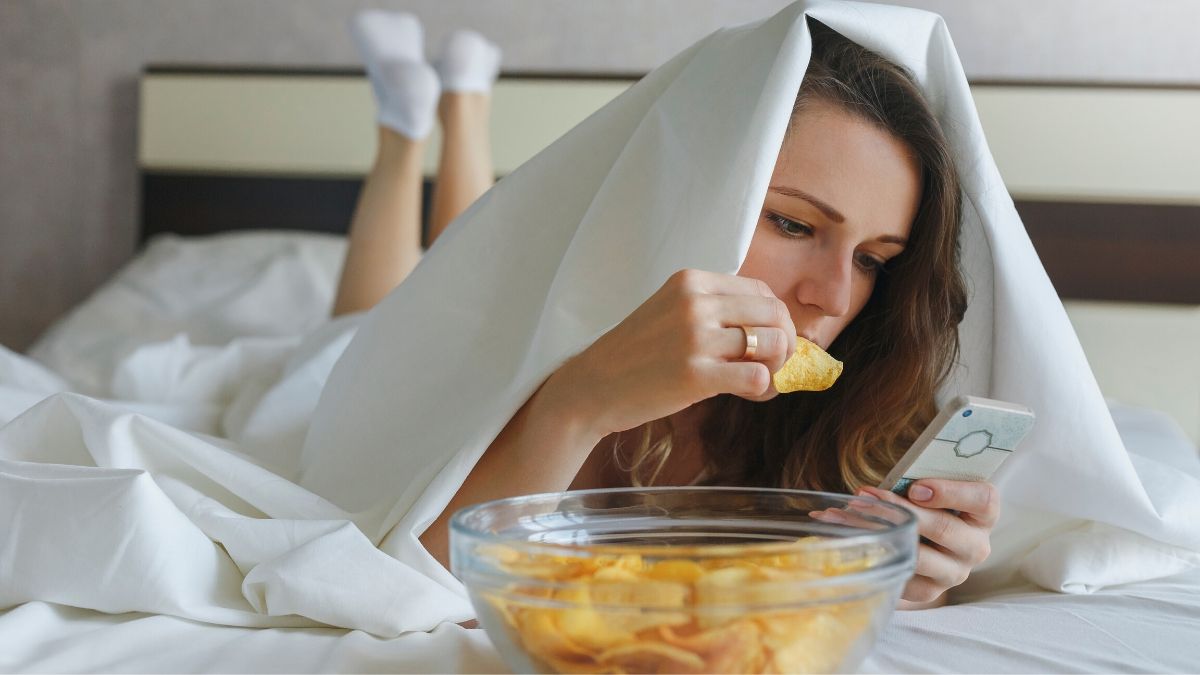BLOG
Curb Your Mindless Snacking with These Simple Suggestions
Back to the blog
You know the scenario: you’re hanging out solo—as you usually are these days—while texting friends, watching TV, or clicking around on your laptop, when an urge to snack comes on. Suddenly, all you can think about is the taste of your favorite potato chips, which just so happen to be waiting for you in your kitchen pantry. Before you know it, you’re elbow-deep in a bag of Lay’s Sour Cream & Onion, unsure whether you’ve experienced true hunger in the first place, or if you’re just eating out of boredom.
It would seem that you’re all too familiar with mindless snacking – or, the eating patterns we exhibit when we reach for snack foods and chow down immediately, without regard to whether our body is craving food, or simply looking for something to do. Unfortunately, many of us have engaged in mindless snacking for years, not thinking of the nutrition the snack provides to our body.
Cravings are okay—but don’t let them rule your life. Remember, everything in moderation, even if you’re still stuck in quarantine, where you’re finding ample opportunities for grazing. Either way, there is no judgment from our side of the table! Many of us have reverted to comforting habits to get through these stressful, anxiety-inducing times, and your coping mechanisms may include snacking.
With America slowly starting to reopen, and many of us eager to return to whatever this “new normal” may hold, you might be considering how to curb these mindless snacking habits, once and for all. And, uCribs is here to help! Here are a few ways to do it.

First, learn the difference between mental and physical hunger.
Are you hungry right now? Your body says no, while your head says yes – or, maybe it’s the other way around. Which signals should you believe? The answer lies in understanding the difference between mental and physical hunger. While physical hunger is related to genuine hunger pangs, mental or psychological hunger can be triggered by all kinds of things, from memories to sensory stimuli, and can result in fleeting cravings.
According to Psychology Today, it’s not uncommon to experience a psychological desire for food, even when you’re full! It might happen during an event as simple as scrolling through your favorite foodie’s Instagram account, or while seeking a distraction from boredom or stress. The next time you face a strong craving, ask yourself if you’d willingly eat a piece of fruit or protein bar, instead. True hunger doesn’t discriminate against food, so if the answer is no, you are likely experiencing mental hunger and should step away from that unopened pack of Oreo cookies ASAP!
Watch your purchasing patterns at the grocery store.
Ever heard the phrase, “out of sight, out of mind?” Whether you answered “yes” or “no,” you should keep this often-cited phrase at the forefront of your mind when taking your weekly trip to the grocery store. Consider how an act as simple as keeping your favorite ice cream stored in your freezer will probably – no, definitely – compel you to eat it…and probably in oversized portions. What’s ice cream, if you aren’t eating it directly from the container, anyway?
While it may sound obvious to some, we suggest that you not purchase any of your usual trigger foods. This way, they are not easily available for you to enjoy when the craving hits. Willpower is great and all, but it’s not always realistic. Wondering what to buy instead? Fruit, vegetables, peanut or almond butters, Greek yogurt, and raw nuts are all delicious options for snacking.
Keep your belly filled with highly nutritious food.
Although it might seem counterintuitive, eating smaller, more frequent meals – including plenty of healthy snacks! – is key to avoiding mindless eating or, worse, a full-on binge. By keeping your belly filled and appetite satisfied, your body is less likely to crave chips, cookies, or whatever else you tend to reach for when you’re mindlessly snacking. And, don’t forget, sometimes, hunger pangs can be mistaken for dehydration—so, it’s always good to fill up on water, as well.
Not only does eating frequently speed up your metabolism, but it also keeps you full for a longer period of time, especially if you focus on foods high in protein and fiber. Plus, studies show that people, who never let themselves go “hangry,” are better equipped to make smart food choices during the day. So, manage your cravings by routinely eating healthy food 90 percent of the time, and you’ll be less likely to turn to those Twinkies when the mood strikes.
Don’t eat in front of the TV, computer, or your smartphone.
This tip is a hard pill to swallow, since many of us habitually enjoy meals and snacks spent in front of the TV. You could even say that you crave it, while watching your favorite show. It’s also possible that the habit is tough to avoid, living in your cramped off-campus apartment, where your coffee table is your dining room table.
Whatever the reasons may be, it’s crucial that you avoid distractions, such as these, when you’re eating or snacking. Otherwise, you’ll lose track of what and/or the amount you’re consuming, resulting in accidental overeating or – you guessed it – mindless snacking. Just see what happens when you fully commit yourself to focusing on your food intake. Slice out a 20– or 30-minute timeframe, then you can get back to whatever you were enjoying on television or your smartphone beforehand!
Food is an obvious day-to-day necessity! It provides us with energy, helps us keep pace with our obligations, and nourishes our mind and spirit. Plus, it’s just downright delicious—well, most of the time, anyway! But, it is possible to enjoy too much of a good thing. If you’ve found yourself mindlessly snacking more often than usual, especially during quarantine or self-isolation, know that there are plenty of ways to curb the habit. These suggestions offer a great way for you to get started!
Share this article:

